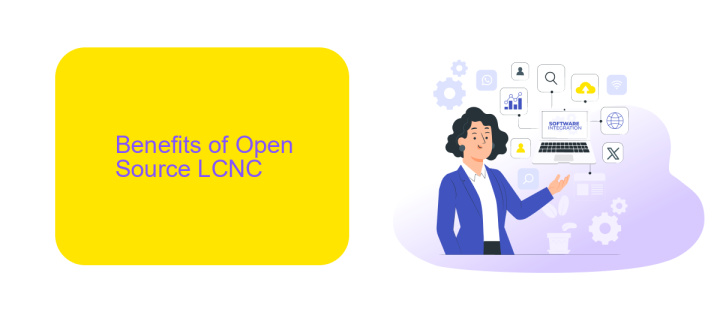Low-Code No-Code Open Source
Low-Code and No-Code platforms have revolutionized software development by empowering users to create applications with minimal coding skills. Open-source solutions in this domain offer unparalleled flexibility and community-driven enhancements. This article explores the benefits, challenges, and key players in the Low-Code No-Code open-source landscape, providing insights into how these tools are shaping the future of technology.
Introduction
The rise of Low-Code and No-Code platforms has revolutionized the way businesses approach software development. These platforms empower users with little to no programming experience to create applications and automate workflows, significantly reducing development time and costs. Open-source solutions in this space offer additional flexibility and customization, making them an attractive option for many organizations.
- Accelerated development cycles
- Reduced dependency on professional developers
- Cost-effective solutions
- Enhanced customization through open-source options
One notable tool that facilitates seamless integration between various applications is ApiX-Drive. This service allows users to connect different software systems effortlessly, enabling smooth data flow and operational efficiency. By leveraging such tools, businesses can further optimize their processes while maintaining a high degree of customization and control.
Benefits of Open Source LCNC

Open Source Low-Code No-Code (LCNC) platforms offer a plethora of benefits, making them an attractive option for businesses and developers alike. One of the primary advantages is the cost-effectiveness, as open-source solutions eliminate licensing fees, allowing organizations to allocate resources more efficiently. Additionally, the transparency of open-source code fosters a collaborative environment where developers can contribute to and improve the platform, ensuring continuous innovation and security enhancements.
Another significant benefit is the flexibility and customization options that open-source LCNC platforms provide. Users can tailor the software to meet their specific needs without being constrained by vendor limitations. For instance, integrating various applications and services becomes seamless with tools like ApiX-Drive, which simplifies the process of connecting different systems. This capability is crucial for businesses seeking to streamline operations and enhance productivity. Overall, the combination of cost savings, collaborative development, and customization potential makes open-source LCNC platforms a compelling choice for modern enterprises.
Types of LCNC Open Source Tools

Low-Code No-Code (LCNC) open source tools have gained popularity for their ability to simplify software development. These tools cater to various needs, from application building to process automation, offering flexibility and efficiency.
- Application Builders: Platforms like Appsmith and Budibase enable users to create custom applications with minimal coding. These tools provide drag-and-drop interfaces and pre-built templates for rapid development.
- Automation Tools: Tools such as n8n and Huginn allow users to automate workflows and tasks. They support integration with multiple services, streamlining processes without extensive programming knowledge.
- Integration Services: ApiX-Drive is a notable example, facilitating seamless integration between various applications and services. It helps users connect different software systems effortlessly, enhancing overall productivity.
These LCNC open source tools empower users to develop and automate applications efficiently, reducing the dependency on traditional coding. By leveraging these tools, organizations can accelerate their digital transformation and improve operational workflows.
Case Studies of LCNC Open Source Success

Low-Code No-Code (LCNC) open source platforms have revolutionized the way businesses approach software development. One notable success story is the implementation of these platforms in small and medium-sized enterprises (SMEs), which often lack extensive technical resources.
For instance, a local e-commerce startup utilized an LCNC open source platform to develop its entire online store. Within weeks, they had a fully functional website with integrated payment systems, all without writing a single line of code. This rapid development cycle allowed them to enter the market quickly and efficiently.
- A healthcare provider streamlined patient data management using LCNC tools, reducing administrative overhead.
- An educational institution created a custom learning management system, enhancing the student experience.
- A logistics company automated its supply chain operations, significantly cutting down on manual processes.
Moreover, services like ApiX-Drive have played a crucial role in integrating various applications and automating workflows. By leveraging such tools, businesses can connect disparate systems seamlessly, ensuring data consistency and operational efficiency. These case studies highlight the transformative potential of LCNC open source solutions in diverse industries.


Future of LCNC Open Source
The future of Low-Code No-Code (LCNC) open source is poised for significant growth and innovation. As businesses increasingly seek to streamline development processes, LCNC platforms offer a compelling solution by enabling users to create applications with minimal coding knowledge. Open source models will play a crucial role in this evolution, fostering community collaboration and accelerating technological advancements. This democratization of software development will empower more individuals and organizations to participate in the digital transformation, leading to a more inclusive tech ecosystem.
Integration capabilities will be a key focus area for the future of LCNC open source. Services like ApiX-Drive are already paving the way by providing robust tools for seamless integration between various applications and platforms. By leveraging such services, users can easily connect their LCNC-built applications with existing systems, enhancing functionality and efficiency. As these integration solutions become more sophisticated, the adoption of LCNC open source platforms will likely surge, driving innovation and enabling businesses to adapt quickly to changing market demands.
FAQ
What is Low-Code No-Code development?
How does Low-Code No-Code benefit businesses?
Is Low-Code No-Code suitable for complex applications?
Can Low-Code No-Code platforms integrate with existing systems?
Are there open-source Low-Code No-Code platforms available?
Do you want to achieve your goals in business, career and life faster and better? Do it with ApiX-Drive – a tool that will remove a significant part of the routine from workflows and free up additional time to achieve your goals. Test the capabilities of Apix-Drive for free – see for yourself the effectiveness of the tool.

